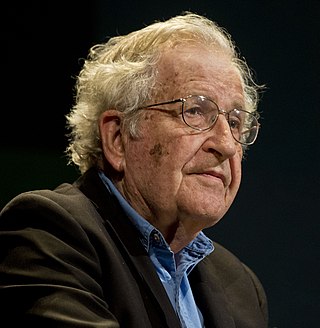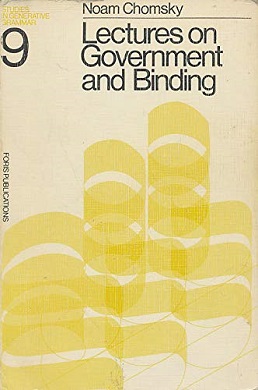Related Research Articles

In linguistics, syntax is the study of how words and morphemes combine to form larger units such as phrases and sentences. Central concerns of syntax include word order, grammatical relations, hierarchical sentence structure (constituency), agreement, the nature of crosslinguistic variation, and the relationship between form and meaning (semantics). There are numerous approaches to syntax that differ in their central assumptions and goals.

Universal grammar (UG), in modern linguistics, is the theory of the innate biological component of the language faculty, usually credited to Noam Chomsky. The basic postulate of UG is that there are innate constraints on what the grammar of a possible human language could be. When linguistic stimuli are received in the course of language acquisition, children then adopt specific syntactic rules that conform to UG. The advocates of this theory emphasize and partially rely on the poverty of the stimulus (POS) argument and the existence of some universal properties of natural human languages. However, the latter has not been firmly established, as some linguists have argued languages are so diverse that such universality is rare, and the theory of universal grammar remains controversial among linguists.
In linguistics, transformational grammar (TG) or transformational-generative grammar (TGG) is part of the theory of generative grammar, especially of natural languages. It considers grammar to be a system of rules that generate exactly those combinations of words that form grammatical sentences in a given language and involves the use of defined operations to produce new sentences from existing ones.
Cognitive linguistics is an interdisciplinary branch of linguistics, combining knowledge and research from cognitive science, cognitive psychology, neuropsychology and linguistics. Models and theoretical accounts of cognitive linguistics are considered as psychologically real, and research in cognitive linguistics aims to help understand cognition in general and is seen as a road into the human mind.
In linguistics, X-bar theory is a model of phrase-structure grammar and a theory of syntactic category formation that was first proposed by Noam Chomsky in 1970 reformulating the ideas of Zellig Harris (1951), and further developed by Ray Jackendoff, along the lines of the theory of generative grammar put forth in the 1950s by Chomsky. It attempts to capture the structure of phrasal categories with a single uniform structure called the X-bar schema, basing itself on the assumption that any phrase in natural language is an XP that is headed by a given syntactic category X. It played a significant role in resolving issues that phrase structure rules had, representative of which is the proliferation of grammatical rules, which is against the thesis of generative grammar.
Deep structure and surface structure are concepts used in linguistics, specifically in the study of syntax in the Chomskyan tradition of transformational generative grammar.

Generative grammar, or generativism, is a linguistic theory that regards linguistics as the study of a hypothesised innate grammatical structure. It is a biological or biologistic modification of earlier structuralist theories of linguistics, deriving from logical syntax and glossematics. Generative grammar considers grammar as a system of rules that generates exactly those combinations of words that form grammatical sentences in a given language. It is a system of explicit rules that may apply repeatedly to generate an indefinite number of sentences which can be as long as one wants them to be. The difference from structural and functional models is that the object is base-generated within the verb phrase in generative grammar. This purportedly cognitive structure is thought of as being a part of a universal grammar, a syntactic structure which is caused by a genetic mutation in humans.
Principles and parameters is a framework within generative linguistics in which the syntax of a natural language is described in accordance with general principles and specific parameters that for particular languages are either turned on or off. For example, the position of heads in phrases is determined by a parameter. Whether a language is head-initial or head-final is regarded as a parameter which is either on or off for particular languages. Principles and parameters was largely formulated by the linguists Noam Chomsky and Howard Lasnik. Many linguists have worked within this framework, and for a period of time it was considered the dominant form of mainstream generative linguistics.

Syntactic Structures is an important work in linguistics by American linguist Noam Chomsky, originally published in 1957. A short monograph of about a hundred pages, it is recognized as one of the most significant and influential linguistic studies of the 20th century. It contains the now-famous sentence "Colorless green ideas sleep furiously", which Chomsky offered as an example of a grammatically correct sentence that has no discernible meaning, thus arguing for the independence of syntax from semantics.
In linguistics, linguistic competence is the system of unconscious knowledge that one knows when they know a language. It is distinguished from linguistic performance, which includes all other factors that allow one to use one's language in practice.
In linguistics and social sciences, markedness is the state of standing out as nontypical or divergent as opposed to regular or common. In a marked–unmarked relation, one term of an opposition is the broader, dominant one. The dominant default or minimum-effort form is known as unmarked; the other, secondary one is marked. In other words, markedness involves the characterization of a "normal" linguistic unit against one or more of its possible "irregular" forms.

The term Cartesian linguistics was coined by Noam Chomsky in his book Cartesian Linguistics: A Chapter in the History of Rationalist Thought (1966). The adjective "Cartesian" pertains to René Descartes, a prominent 17th-century philosopher. As well as Descartes, Chomsky surveys other examples of rationalist thought in 17th-century linguistics, in particular the Port-Royal Grammar (1660), which foreshadows some of his own ideas concerning universal grammar.

Aspects of the Theory of Syntax is a book on linguistics written by American linguist Noam Chomsky, first published in 1965. In Aspects, Chomsky presented a deeper, more extensive reformulation of transformational generative grammar (TGG), a new kind of syntactic theory that he had introduced in the 1950s with the publication of his first book, Syntactic Structures. Aspects is widely considered to be the foundational document and a proper book-length articulation of Chomskyan theoretical framework of linguistics. It presented Chomsky's epistemological assumptions with a view to establishing linguistic theory-making as a formal discipline comparable to physical sciences, i.e. a domain of inquiry well-defined in its nature and scope. From a philosophical perspective, it directed mainstream linguistic research away from behaviorism, constructivism, empiricism and structuralism and towards mentalism, nativism, rationalism and generativism, respectively, taking as its main object of study the abstract, inner workings of the human mind related to language acquisition and production.

Lectures on Government and Binding: The Pisa Lectures (LGB) is a book by the linguist Noam Chomsky, published in 1981. It is based on the lectures Chomsky gave at the GLOW conference and workshop held at the Scuola Normale Superiore in Pisa, Italy, in 1979. In this book, Chomsky presented his government and binding theory of syntax. It had great influence on the syntactic research in early 1980s, especially among the linguists working within the transformational grammar framework.
GLOW is an international organization to further the study of generative grammar, founded in 1977 and based in the Netherlands. Its activities include its annual spring linguistics conference and periodic summer schools. In the past, GLOW published a newsletter that discusses current intellectual issues in the study of generative grammar. The GLOW name originally stood for "Generative Linguistics in the Old World."

In linguistics, the term formalism is used in a variety of meanings which relate to formal linguistics in different ways. In common usage, it is merely synonymous with a grammatical model or a syntactic model: a method for analyzing sentence structures. Such formalisms include different methodologies of generative grammar which are especially designed to produce grammatically correct strings of words; or the likes of Functional Discourse Grammar which builds on predicate logic.

Current Issues in Linguistic Theory is a 1964 book by American linguist Noam Chomsky. It is a revised and expanded version of "The Logical Basis of Linguistic Theory", a paper that Chomsky presented in the ninth International Congress of Linguists held in Cambridge, Massachusetts in 1962. It is a short monograph of about a hundred pages, similar to Chomsky's earlier Syntactic Structures (1957). In Aspects of the Theory of Syntax (1965), Chomsky presents many of its ideas in a more elaborate manner.
Lexicalist hypothesis is a hypothesis proposed by Noam Chomsky in which he claims that syntactic transformations only can operate on syntactic constituents. The hypothesis states that the system of grammar that assembles words is separate and different from the system of grammar that assembles phrases out of words.
Henk van Riemsdijk is a Dutch linguist and professor emeritus at Tilburg University.
The basis of Chomsky's linguistic theory lies in biolinguistics, the linguistic school that holds that the principles underpinning the structure of language are biologically preset in the human mind and hence genetically inherited. He argues that all humans share the same underlying linguistic structure, irrespective of sociocultural differences. In adopting this position Chomsky rejects the radical behaviorist psychology of B. F. Skinner, who viewed speech, thought, and all behavior as a completely learned product of the interactions between organisms and their environments. Accordingly, Chomsky argues that language is a unique evolutionary development of the human species and distinguished from modes of communication used by any other animal species. Chomsky's nativist, internalist view of language is consistent with the philosophical school of "rationalism" and contrasts with the anti-nativist, externalist view of language consistent with the philosophical school of "empiricism", which contends that all knowledge, including language, comes from external stimuli.